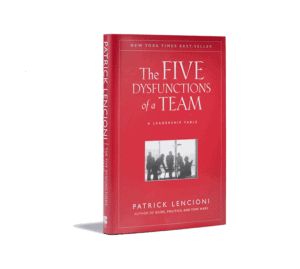 The Five Dysfunctions of a Team by Patrick Lencioni
The Five Dysfunctions of a Team by Patrick Lencioni
Reviewed by: Glain Roberts-McCabe
The Premise: First published in 2002, The Five Dysfunctions of a Team provides a framework to help identify and fix issues within groups that cause them to derail. Through a business fable, Lencioni takes you through the journey of a new CEO who’s tasked with turning around a failing business. She begins by realigning the executive team. The story walks you through the key dysfunctions that cause teams to fail: absence of trust, fear of conflict, lack of commitment, avoidance of accountability, inattention to results. The executive composites used in the book (the arrogant technical expert, the lone wolf, the passive resister, the early adopter) are easily identifiable… we’ve all worked with these types of personalities. Through a simply told story, Lencioni effectively lays out the building blocks on how to improve team performance.
The Bottom-line: After recently seeing Pat Lencioni speak at the Art of Leadership event here in Toronto, I decided to pull this one off my bookshelf and bring it forward to our members. This is one of those timeless management books that everyone should skim through at least once in their careers, but particularly if you’re tasked with turning around a team. Personally, I’m not a fan of the business fable approach (it all seems too cliché), but this story moves very well and the characters in the book are all highly relatable. That being said, I do wonder if the people who’ll benefit from the book are those who are already sporting a particularly high EQ / people orientation. At the very start, Lencioni asserts that you have to have high trust on a team in order to be effective. In order to contribute to building trust, the leader needs to be able to show vulnerability. My question to Lencioni at the conference was this: “what if the leader in question has a phenomenally high IQ and sees zero value in EQ and the word “vulnerability” isn’t even in their dictionary? Then what?” The response I got was this: “Thanks for your question. A very interesting one.” In a follow-up email I was encouraged to buy his team assessment. Gotta love consultants. All this to say, it does reinforce my own observation which is this: people who tend to buy into and embrace the approaches suggested by Pat Lencioni also buy into and embrace the fact that people drive results (not the other way around).
Roundtable Rating: highly recommended for anyone needing to learn more about team dynamics


